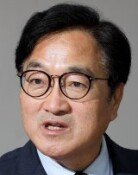[Editorial] Small but Better Government
[Editorial] Small but Better Government
Posted January. 31, 2008 07:07,
Wed like to express our views on the sound government model once again. We believe that a small but highly professional and strong government is an ideal government for the national interest and the wellbeing of the public. If you put it in an acronym, it spells a spas government.
The government that serves the people, which President-elect Lee Myung-bak and the presidential transition committee have underlined, is a prerequisite for a win-win between the government and the people. An efficient and functional government will more likely follow when we have a spas government. We believe that the Lee Myung-bak administration will be able to expel the accumulated evils of the past government to reunite the people and revive the national growth engine, only when it pursues the spas government.
Although a small government should hand over some of its work to the private sector without hesitation, it must not neglect its essential duties. Just simply clarifying when the government will intervene and when will not, regulations that stifle the creativity and vitality of the private sector can be dramatically reduced. In order for a small government to reinvigorate the private sector, members from all sections of society must significantly reduce their dependence on the government.
If the incoming government wants to become a highly functional government, it must make efforts to enhance the expertise of civil servants. It is only natural that the representatives of Korea with less than one year experience in the Korea-U.S. trade negotiations lose at a tugof-war with their U.S. counterparts with more than 10 years experience in the field. Unless the government rids of the malicious practice of lenient personnel management involving sharing and distributing major posts and the so-called, revolving door appointments, which are made with an intention to help certain officials build up their career, the government will have a long way before it improves the expertise of government employees.
The next administration must be a small but strong government that firmly adheres to principles. The nation longs for a government that respects the ideas of the people and the public opinion, while never giving in to badgering laws over illegal actions. Francis Fukuyama, an American political scientist, stresses the importance of a small but strong government. He said that, although the government must reduce the scope of its authority, it should have greater influence on the selected areas. In this respect, Lee did the right thing to urge the Korean Confederation of Trade Unions to abide by the law since the union has repeatedly staged illegal strikes and even announced illegal walkouts in advance.
Leaders who have succeeded in economic reform in the latter half of the 20th century have commonly emphasized pragmatism than ideology, while focusing on economic development rather than politics. Former U.S. President Ronald Reagan, former U.K. Prime Minister Margaret Thatcher, former Chinese leader Deng Xiaoping, former Japanese Premier Junichiro Koizumi, and former Singaporean Prime Minister Lee Kuan Yew and former Dutch Premier Dr. Ruud Lubbers are some of the leaders that built a strong foundation for the nation with a small government and strong leadership.







